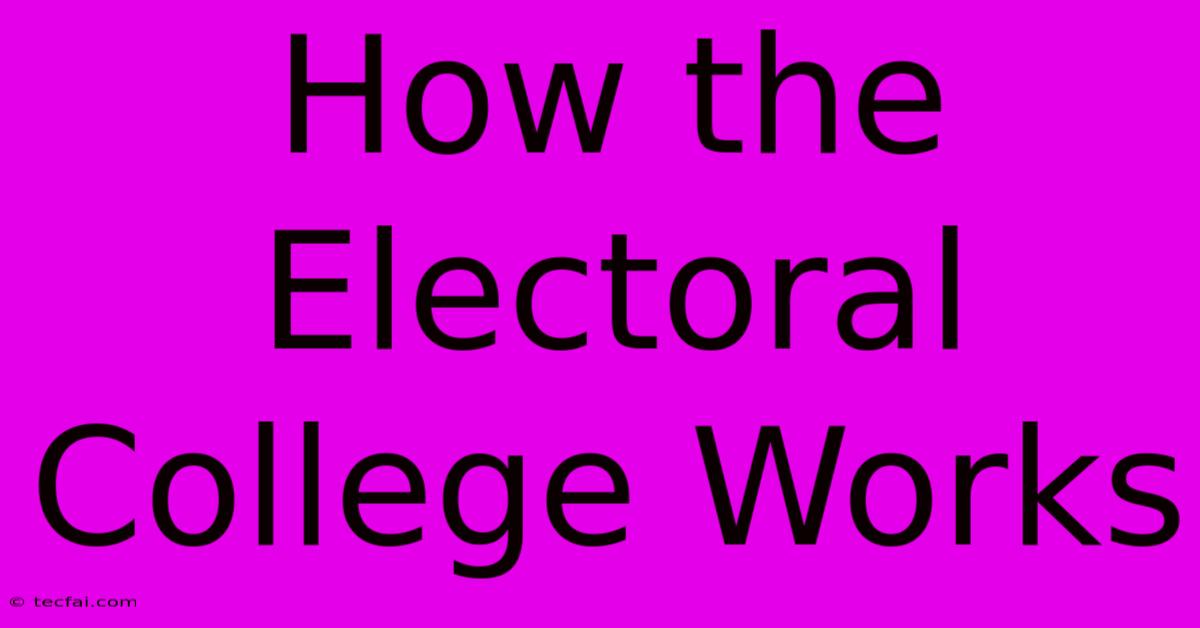How The Electoral College Works

Discover more detailed and exciting information on our website. Click the link below to start your adventure: Visit Best Website tecfai.com. Don't miss out!
Table of Contents
How the Electoral College Works: Understanding the System That Elects the President
The United States Presidential Election is a complex process, and the Electoral College is a key element that often sparks debate. While many understand the concept of voting for a candidate, the Electoral College adds a layer of intricacy. This article will delve into the workings of the Electoral College, explaining how it functions and the reasons behind its existence.
The Basics: How the Electoral College Works
The Electoral College is a system that determines the winner of a presidential election. It's not a direct popular vote, but rather a system of electors chosen by each state based on its population.
Here's a step-by-step breakdown:
- Each state is assigned a specific number of electors, based on its representation in Congress (House of Representatives + Senate). For example, California, with a large population, has 55 electors, while Wyoming, with a smaller population, has just three.
- Candidates for president campaign across the country, aiming to win the popular vote in each state.
- The candidate who wins the popular vote in a state typically receives all of that state's electoral votes. This is known as the "winner-take-all" system.
- To win the presidency, a candidate needs to secure at least 270 electoral votes out of a total of 538. This number represents a majority of the total electoral votes.
The Purpose of the Electoral College
The Founding Fathers established the Electoral College for several reasons:
- To prevent the influence of large, densely populated states from dominating the election. The Electoral College ensures that smaller states have a voice and are not overshadowed by populous states.
- To encourage candidates to campaign in all regions of the country, not just heavily populated areas. The need to secure electoral votes in various states motivates candidates to focus on a broader range of voters and issues.
- To ensure that the president is elected by a broad coalition of voters, not just a narrow majority. This system aims to promote unity and stability.
Controversies and Criticisms of the Electoral College
Despite its historical context, the Electoral College is not without its critics. Here are some of the main arguments against it:
- It's possible to win the popular vote but lose the presidency. This has happened five times in U.S. history, most recently in 2016. The candidate with the most popular votes nationwide may not necessarily secure the required number of electoral votes.
- It can disproportionately benefit certain states. The "winner-take-all" system can lead to candidates focusing their campaigns on states with a high concentration of electoral votes, even if those states have a relatively small population.
- It undermines the principle of "one person, one vote." Critics argue that the Electoral College dilutes the voting power of individuals in certain states, as their vote may hold less weight than a vote in a state with fewer electors.
The Future of the Electoral College
The debate over the Electoral College continues. Some advocate for its abolition and the adoption of a national popular vote system, while others defend its role in ensuring representation and promoting unity. The future of the Electoral College remains uncertain, but it continues to be a crucial topic in American politics.
By understanding the mechanics and rationale behind the Electoral College, we can engage in informed discussions about its impact on the democratic process and its future.

Thank you for visiting our website wich cover about How The Electoral College Works. We hope the information provided has been useful to you. Feel free to contact us if you have any questions or need further assistance. See you next time and dont miss to bookmark.
Featured Posts
-
Quincy Jones 10 Songs Defining His Genius
Nov 05, 2024
-
Dennis Allen Out As Saints Head Coach After 7th Loss
Nov 05, 2024
-
2024 Electoral College Key Changes
Nov 05, 2024
-
Us States Election Day Voter Registration Map
Nov 05, 2024
-
Badenochs Team Welcomes Robert Jenrick
Nov 05, 2024
